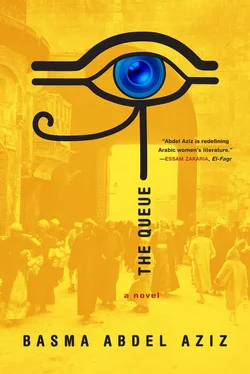Back in Tarek’s office, Yehya stood up to leave. Amani rushed to help him, while Tarek stood there watching them curiously, as if reconsidering his medical evaluation of the case. Their cups of tea sat untouched, but they thanked him for his time and Amani asked him to let them know as soon as the head nurse returned, adding that she would call him if anything changed.
They found Nagy stretched out in a chair with his eyes closed, and Amani gently shook his shoulder. His eyes snapped open, and then he closed them again and sluggishly stood up. A few minutes later they arrived at a deserted microbus stop. Nagy broke the silence, suggesting that Yehya stay at his place for the night and rest up after such an exhausting day. Yehya quickly agreed, indulging in the hope of a quiet night to consider the possibilities in front of him. But Amani barely heard them; her mind was fixed on one thing. Suddenly she announced that she would go to Zephyr Hospital and submit a request for the X-ray. Yehya objected instantly, opposed to the idea of her going to that place by herself; just the thought of it made him anxious. His own experience there was not at all encouraging, and Amani knew what had happened to him there, but Nagy supported her. He told Yehya to stop and think about it, to put his feelings aside and listen to reason. Amani was far less likely to raise suspicion, for a reason that was obvious to all of them: Yehya was clearly injured, and that was impossible to hide.
Yehya went straight back to the queue the next morning, only to find someone in his place. The newcomer had arrived and insisted that Ines let him stand behind her given his circumstances, as he was in a rush to finish what he came for and return to his hometown. He had asked her with deep reverence and conviction, as he gazed up at the sky: if he were not fated for that spot, why would God have compelled him to walk from the end of the queue all the way to her? Ines hadn’t been particularly bothered by Yehya’s presence behind her over the past several days, yet neither was she especially grateful for it. She wasn’t overly interested in him. He kept to himself, not joining anyone — other than his friend — in anything, neither friendly conversation nor fights. He’d spoken to her only once and hadn’t even bothered to tell her that he was leaving or when he would be back. She hesitated momentarily to wrestle with her conscience — she didn’t think it was right to hand over a place in the queue so easily — but after another moment, she gestured at the place and shrugged disinterestedly. With her consent, Shalaby took Yehya’s place, making sure to stamp his footprint in the ground, and then stood there, delighted with his own resourcefulness. He cast a proud glance at the horizon, which was brimming with people behind him. The queue grew longer and longer every day, and the space it took up grew ever wider. He noticed that while only a few people left and didn’t return, new waves arrived every day, stretching the queue ever farther. He had even heard rumors, later revealed to be untrue, that it had crossed into the neighboring governorate.
Yehya didn’t blame Ines; after all, it had been Shalaby’s idea, and she had only reluctantly given in. He didn’t think there was any point in speaking to Shalaby, either, since he stood there with such bravado, obstructing the place like a concrete pillar. Luck had never been on Yehya’s side, even from the start, and he turned away, head hanging low. He slowly squeezed himself into an Upper Line microbus, a kind he hadn’t taken before. Nagy had told him that the Upper Line was just one of several lines created recently, because one day, without any discussion, everyone had begun to drive on the sidewalks, abandoning the roads to the people in the queue. Three hours later he arrived at the back of the queue and took up a new place at the very end. Once there, he cast a long look at the Gate. From afar, it looked like a solid wall, and he wondered in despair whether it would ever open.
Amani answered the phone; the network was back up. Her voice caught in her throat, shaky and choked, and at first Nagy thought she was ill. He realized that she was on the way to the former District 3 to give her condolences to Um Mabrouk, whose elder daughter had died. Her heart had given out one day, after she had waited years to replace its malformed valves. He realized that it wasn’t a good time and quickly ended the conversation, asking her to call him back when the funeral was over.
Amani sobbed harder as she approached Um Mabrouk’s apartment, imagining Yehya dying. She pictured his funeral procession, and mourners departing from the queue to join it, and then burying him in a mass grave for victims of the Disgraceful Events, all without the bullet ever being removed.
She arrived in the courtyard with red, swollen eyes, her face drained and pale. Um Mabrouk was sitting by the front door, barefoot and wearing a black headscarf tied behind her head. Her neighbors sat around her, crying and comforting her, making coffee and tea, and sharing memories about the girl. Um Mabrouk stood up when she saw Amani coming, leaned on the women for support, and then rushed toward her. They hugged for a long time while Um Mabrouk sobbed, begging those around her to agree about how hard she had it, and then she began to console Amani, who was crying even harder, suddenly overwhelmed by the terrifying scenes in her imagination and the feeling of being completely alone. Um Mabrouk thanked her for having taken the trouble to come, grateful because she thought Amani might have been too exhausted, given the situation.
“Don’t worry, Amani, don’t work yourself up like this. She really loved you … but it’s all in God’s hands. Death comes for us all, in the end.”
Amani stayed until the mourners dispersed and all the neighbors went home. She felt heavy in her seat and couldn’t bring herself to leave. Finally, Um Mabrouk began to climb the stairs to bed, along with her husband, who had appeared at the last minute, and she offered to let Amani spend the night if she wanted. It wasn’t until then that Amani finally managed a few words of condolence and said goodbye.
Um Mabrouk needed to use the death of her elder daughter as leverage to save the younger one, so she gathered the death certificate and all the tattered reports she’d saved since her daughter was a child and made the rounds of her acquaintances, asking for the funds she needed to get help. She wouldn’t leave until she told them of the misfortune that had befallen her and the second tragedy that lay ahead, and she asked for help from all her neighbors, even Amani’s doorman. Yet despite her efforts, she didn’t manage to collect enough money for the operation. She knocked on the hospital director’s door more than once, and when she couldn’t find him there she waited next to his official car. She bent down and kissed his hand as soon as he appeared, pleading with him to waive just half the fee, but he shook her off with disdain and directed her to the Gate of Maladies, which presided over such cases.
The Gate of Maladies had been built a long time ago, and Um Mabrouk hadn’t been there since she was just a child, prone to illness. A doctor had warned her mother not to ignore Um Mabrouk’s chronically inflamed tonsils, so she took her to a public hospital to have them removed. The doctor there told her to go to the Gate of Maladies, a new ministry that now had jurisdiction over the hospital. There, he promised, she could sign up for free treatment. The Gate of Maladies was clean and tidy when they arrived — not many people had yet set foot inside — and she registered her name. But her turn never came. In the end, she had to go to a private doctor; he lowered his fee for her, and her mother borrowed the rest. He removed her tonsils, the matter ended, and she hadn’t been back to the Gate of Maladies since.
Читать дальше











